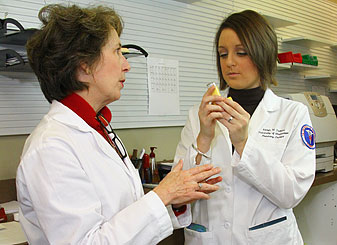60 students share in ministry of medicine

Clinical Assistant Professor Rachel C. Robinson teaches pharmacy
student Addy Stone Dinkins proper use of an inhaler at the Oxford
Medical Ministries Clinic, where both are volunteers.
harmacy students are helping uninsured residents in Lafayette and Yalobusha counties get the health care they need by working at the Oxford Medical Ministries Clinic, which provides free services to working adults with low incomes.
Working at the clinic was a valuable experience, said Melissa Webster of Madison, a fourth-year pharmacy student.
“I loved volunteering at the clinic,” Webster said. “The patients were great, and they have helped me just as much as I helped them. They didn’t mind us taking the time to counsel them on their medications, and they were always grateful for everything the volunteers at the clinic could do for them. It was a great experience for me to draw from for school, as well as for my work as a pharmacist.”
The clinic's primary focus is treating and preventing chronic diseases. It serves 515 patients and fills about 100 prescriptions during clinic hours each Tuesday night.
Clinical Assistant Professor Rachel C. Robinson became a clinic volunteer in fall 2008 and saw an opportunity for students to become involved. Since then, more than 60 students have helped out at the clinic.
“After volunteering for several weeks at the clinic, I realized what a great learning environment the clinic was for our students,” Robinson said. “I asked for volunteers and was very pleased with the interest.”
The clinic’s primary focus is treating and preventing chronic diseases. It serves 515 patients and fills about 100 prescriptions during clinic hours each Tuesday night, when the pharmacy is open.
Under the supervision of the clinic’s staff pharmacist, students help fill prescriptions, stock medications, provide patient counseling and answer medication-related questions from clinic nurses and physicians. They also learn about the functions of an ambulatory clinic and patient assistance programs.
“The students ease the workload of the pharmacists, allowing pharmacists to have more time to answer physicians’ questions and to interact with physicians and patients,” said Marlene Bishop, the clinic’s executive director.
Pharmacy students, on the other hand, receive a glimpse of the tough decisions facing the uninsured.
“I learned about the challenges that many of the patients faced in having to make difficult choices between their basic health and other amenities,” said Robert Peel of Hendersonville, Tenn., a third-year professional pharmacy student. “I gained valuable real-world knowledge as it pertains to the practice of pharmacy, and I learned about the challenges that exist in providing good health care to all segments of the population.”
|

